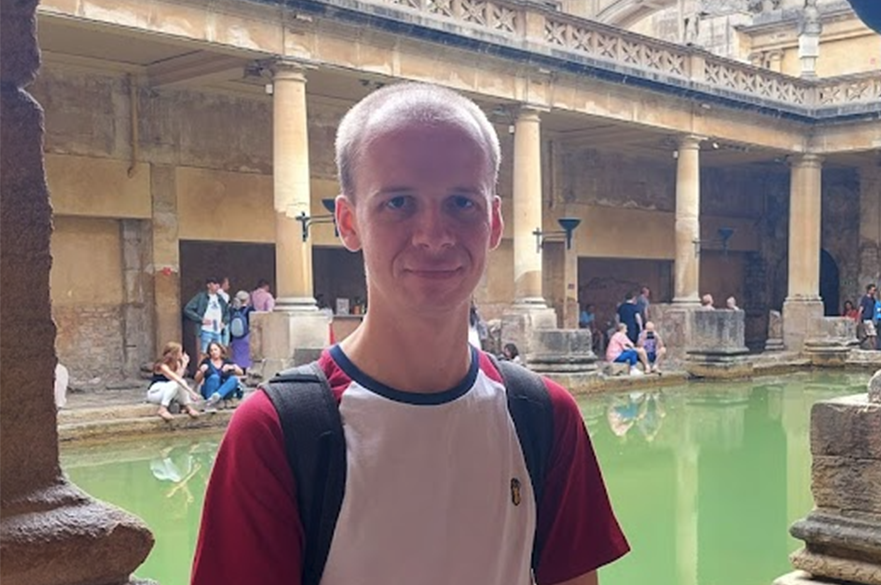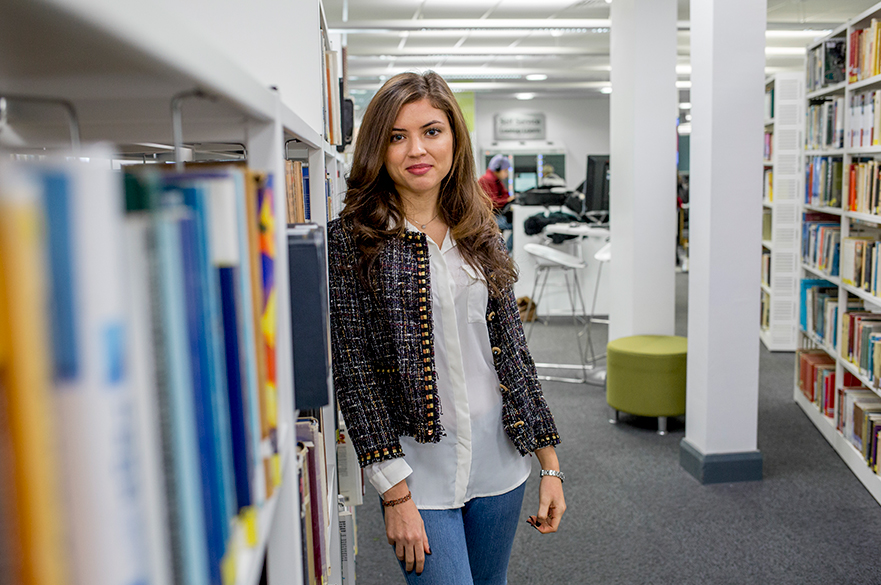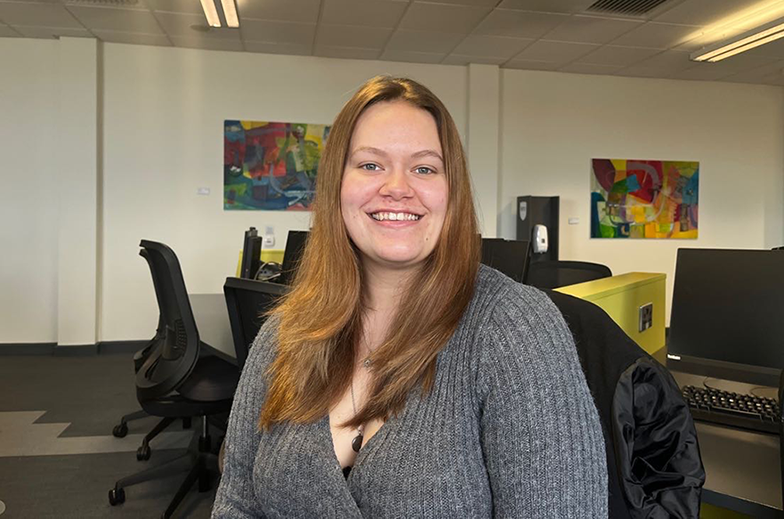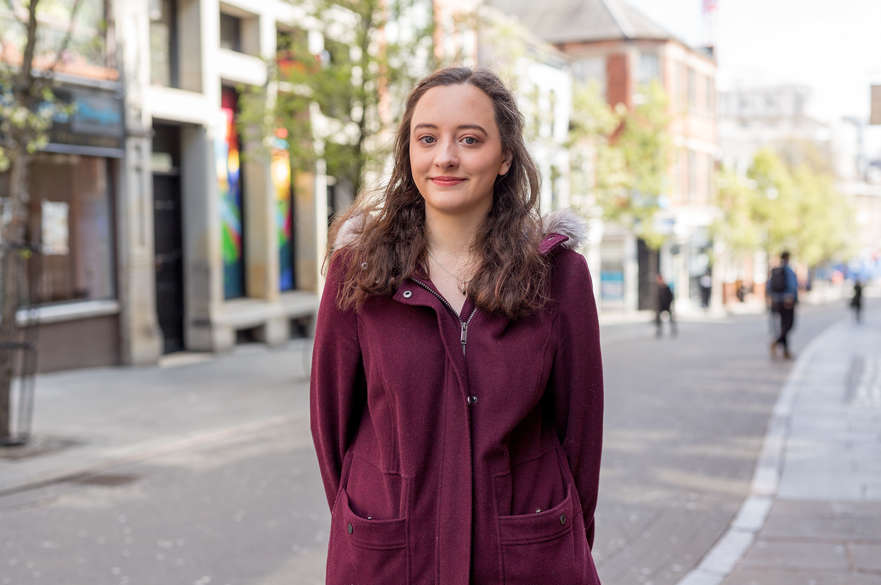
The study of History encompasses many fundamental aspects of writing which place prospective graduates in good standing when navigating a competitive job market.
More about Edward
Edward Hammond graduated from NTU in 2018 with a BA in History. He is now a Senior Operations Officer for Student Engagement and Experience at the University of Nottingham. In our catch up, Edward explains how his degree and extra-curricular activities equipped him with vital transferable skills that helped shape the direction of his career.
Why did you choose to study at NTU?
I chose to study at NTU as someone who was already local to the area, and since I had strong local foundations and connections which supported my research interests that I wanted to pursue and which lecturers on the course had expertise in. I had heard good things about NTU from family members who had studied there in different courses, and the modern campus facilities were also enticing as an environment in which I wanted to learn and develop professionally.
What did you learn – both inside and outside of lectures?
Throughout my course, I learned about the fundamentals of being a historian, and a good one at that. At the time, I don’t think I fully appreciated how applicable this learning would be to my future self and day-to-day life, regardless of which job I had. Learning the historian’s craft involved much more than honing crucial skills in critical analysis, argument and evaluation. The development of these skills is rooted in being able to express yourself coherently and with persuasion that is supported by a clear written structure. As an academic discipline which revolves around debate and the application of research to build credible arguments and theories about ‘the past’ (which informs our understanding of the present and future), the study of History encompasses many fundamental aspects of writing which place prospective graduates in good standing when navigating a competitive job market. One of the simplest examples of this is learning how to ‘sell yourself’ effectively in a job application and being able to provide evidence of your skills using clear examples. I remember realising how useful the transferable skills which I had developed on my course were in supporting me to do this, because in many ways I was performing the same function as a critically-informed essay – stating a point or argument (such as ‘I am very good at this’), and then communicating the evidence of this clearly based on different sources of information such as references – all in order to convince my reader (the prospective employer) to believe my argument, which was that they should hire me!
My module specific learning was suitably broad, particularly in the first year of my undergraduate course, but it grew more and more specialised as I progressed and as I developed more of my own research interests. As an enormous history buff, though, everything was interesting to me! The periods and subjects I studied spanned eras and time frames as wide as the geo-political history of the crusades right through to the transformation of Britain after the Second World War. But that wasn’t all, as I also studied modules dedicated to British social, religious and political history between the 17th and 19th centuries.
There were a lot of extracurricular opportunities for me outside of my standard lectures and seminars which were an important part of my personal development, including for the workplace. In my second year, I served as the social secretary for NTU History Society which involved organising the society’s events programme. Seeing our first historic bus tour of Nottinghamshire and our annual boat ball come to fruition were perhaps my biggest achievements, as they always require more logistical effort than you think! I was also a frequent student ambassador for my undergraduate course at university open days, where I got to speak to prospective students and their families about what it’s like to study at NTU and to answer questions they may have had. For me, student representation felt especially important, which is why I always sought to maximise my involvement in my course and wider university community besides my pedagogical learning.
Finally, the work experience element of my course demonstrated a recognition of the need for students to prepare for the workplace early, along with many of its conflicting demands which require you to put in place strategies for good time management and prioritisation. In my opinion, the exact nature of the work experience that you undertake does not matter so much, rather it is the skills you learn along the way which are applicable to almost all modern-day workplace environments. Even more importantly, your ability to reflect on how you have developed meaningfully will serve you well in the future as more and more emphasis is placed on understanding your professional development needs which are aimed at supporting career progression.
What does your current day involve?
In one sentence, my current role is to support and enhance the student engagement activities and initiatives of the University of Nottingham’s School of Politics and International Relations. The role is incredibly varied, and while my day-to-day work varies to some extent depending on the time of year in the academic cycle, I am principally responsible for coordinating much of the school’s student-facing communications. This includes, but is not limited to, event organisation and promotion on the school’s social media channels, gathering student feedback and supporting national campaigns like the NSS, peer mentoring advertisement and recruitment, welcome week programme planning and operational management of the school’s attendance monitoring processes. I also support others in my immediate team and school teaching staff in the delivery of events and other student-facing initiatives.
What attracted you to this field of work?
In the grand scheme of things, I was very recently a student – completing my master’s degree in 2020.
My earlier extracurricular roles at NTU developed a real passion for and appreciation of the value of meaningful student engagement whilst at university and the opportunities it can open for you.
Additionally, between my undergraduate degree and my master’s, I undertook a three-month long internship at NTU Libraries which was focussed on using a range of simple qualitative and ethnographic research methods to better understand students’ preferences for study across campuses. This reinforced a strong foundation for using research to develop evidence-based models for change in a real-life work environment, while also allowing me the opportunity to put into practice many of the research skills I had developed on my course.
Initially, the prospect of actually working at a university did not really occur to me, it was only when my careers advisor suggested it to me that I began to seriously consider it as a good fit for my skills. Not desiring to try and move straight into a PhD, I wanted to work in a professional environment but one that was also surrounded by a community of learning, as that’s what universities ultimately exist to be. As someone who loves a good debate, whether in History or Politics, I feel I’m in my natural environment, where I also get to do a lot of ‘fun’ stuff in trialling new technologies and systems to improve our working practices – all aimed at enhancing the overall student experience.
How has your degree influenced your career?
My degree has had a profound impact on my career so far, and in multiple ways. Clearly, having been in a university environment, getting involved in those critical extracurricular opportunities while I was a student developed an appreciation in me of why student engagement was so important to support your own career prospects. It’s not about saying ‘I did this while I was at university’, it’s about reflecting on the skills you actually developed while doing those duties which you simply would not have got from listening to lectures, reading and completing assessments. The university experience is about so much more than that. Finally, I am still using many of my foundational research skills in my day-to-day duties. Whether that is to develop an evidenced-based policy proposal or initiative, conducting focus groups or collating data and using it to support an argument or understand trends – it’s all research!
What challenges have you faced?
Time management often presents a big challenge, in particular making time for professional development and training as your responsibility grows. Early on in my role, I signed up for an accredited course on developing skills in Leadership and Management which lasted for 3 months and consisted of live interactive workshops, independent learning, presentations and assessed workbooks. Finding the time to do this aside from my day job could seem overwhelming, and I considered withdrawing from the course because of it. However, I came to realise that I needed to overcome what seemed like a psychological barrier where my brain treated the work like a chore rather than an actual opportunity for me to learn and develop. To help tackle this, I started to compartmentalise and break down the assessment elements into smaller chunks (like I used to do at university, except now I felt I had even less time on my hands). For example, if I needed to dedicate time in the evenings after work to doing the assessment, I would not do more than one section or question at a time, at least to begin with. What I found was, over time, and as I was able to increasingly relate my learning to scenarios in the workplace, my attitude shifted and motivation towards progressing on the course improved dramatically. This also meant I felt able to complete larger sections of the work in a single sitting, while I did not feel bad or guilty for only doing a few sentences or paragraphs on other occasions – which is better than deciding not to do anything at all.
What have been the highlights and biggest challenges of your career so far?
In my current role, one highlight for me has been the amount of responsibility I have been given on some areas; more than I had envisioned being still relatively new to my role. For example, I had complete oversight over and responsibility for arranging my department’s programme of Welcome Week activities for our incoming student cohort. A key part of this experience was learning how far in advance it is necessary to plan for projects on this scale and how many people are involved, particularly for extra-curricular talks and activities delivered alongside colleagues in other teams like the employability service and alumni relations team. The best part of this project, while having its own stress points and challenges throughout the year, was seeing it through to completion and ensuring the week went smoothly and that students had the best experience possible in being welcomed to the school. This was perhaps the ultimate test of my project management skills to date. An important thing to remember, though, is that you wouldn’t be placed in such positions of responsibility if your manager or colleagues didn’t think you could do it!
What are your plans for the future?
In the long-term, I would like to progress into a management role, either here or at another institution. Other than that, I’m keeping my options open! Eventually, I might consider doing a part-time PhD.
If you had a time machine, what would you go back and tell yourself at uni?
Not to worry so much about my future, because doors will open including when others are shut. It’s also important to be adaptable, but at the same time work on refining and perfecting your inherent talents which make you stand out from everyone else – they will get recognised and rewarded.
History and heritage is a route to your future.
Challenge your digital literacy, analytical, interpretive and communication skills to open up limitless professional possibilities.
NTU graduate?
Stay connected with the NTU alumni and supporter community.
Still need help?
-

STUDENT PROFILE
Allegra Masciarelli
History with International RelationsItaly
https://www.ntu.ac.uk/study-and-courses/courses/our-students-stories/arts-humanities/allegra-masciarelli
-

STUDENT PROFILE
Emily Thompson
HistoryUnited Kingdom
https://www.ntu.ac.uk/study-and-courses/courses/our-students-stories/arts-humanities/emily-thompson
-

STUDENT PROFILE
Emma Allsop
HistoryUnited Kingdom
https://www.ntu.ac.uk/study-and-courses/courses/our-students-stories/arts-humanities/emma-allsop